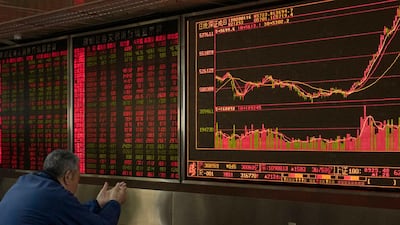Foreign capital flows to emerging markets are forecast to decline 53 per cent in 2020 due to Covid-19 and lower commodity prices, according to the Institute of International Finance (IIF).
"The Covid-19 shock has caused a pronounced sudden stop in capital flows to emerging markets," said Elina Ribakova, deputy chief economist and economists Benjamin Hilgenstock, and Jonathan Fortun in a report on Wednesday.
Non-resident flows to the emerging markets are projected to fall to $444 billion (Dh1.6 trillion) in 2020, significantly lower than last year and below levels witnessed during the 2008 global financial crisis as well as the 2015 stock market rout in China.
A global economic recession triggered by the coronavirus pandemic is expected to be deeper than the one that followed the global financial crisis in 2008-09, according to the International Monetary Fund. The outbreak is the biggest challenge to the global economy since the 2008 financial crisis. It has disrupted trade and supply chains, paralysed the travel industry and rattled investors, wiping about $20tn from stock markets globally.
“While we expect a recovery of flows in the second half of 2020, we do not believe that the pickup will be strong enough to bring about a return to 2019 levels,” Ms Ribakova wrote. “The recovery in flows will most likely follow that of economic activity, with EM Asia leading the way, and Latin America and frontier markets remaining subdued the longest.”
Total foreign investments in emerging markets, excluding China, are expected to reach $304bn, the lowest since 2004, while portfolio investment for the year will likely be negative at $41bn due to the risk-averse sentiment in the first half of 2020.
Emerging markets have experienced record portfolio outflows in the first quarter, larger than during any recent crisis episode, due to the coronavirus pandemic and a substantial drop in oil prices, with outflows estimated at around $83bn in March alone.
So far this year, emerging markets recorded portfolio equity outflows of $72bn and debt outflows of $25bn.
“EM Asia was particularly affected, then other EMs began to suffer significant outflows as the pandemic spread," IIF said.
Though the impact of the coronavirus led to record outflows for overall emerging markets, Chinese assets have suffered less when compared with similar outflow episodes.
“Our base scenario assumes that non-resident portfolio flows will begin to recover in the second half of 2020 as countries emerge from Covid-19-related shutdowns and benefit from accommodative monetary policy in G-3 countries," IIF said.
Still, the Washington-based organisation forecasts non-resident portfolio flows to emerging markets, excluding China, to be negative for the whole year.
“The collapse in equity flows is expected to be broad-based, with all regions except Africa and the Middle East experiencing sizeable outflows," the IIF said. "We foresee a slow recovery of equity flows due to a sluggish rebound in emerging market growth.”
The institute also forecasts debt flows to be negative in both Latin America and emerging Europe, with the former seeing outflows of more than $16bn and the latter of $5bn.
Commodity exporters are expected to be "severely affected” by the decline in oil prices. The IIF projects Russia’s current account surplus will shrink by roughly $50bn. Commodity importers will only marginally benefit from lower commodity prices due to shutdowns in economic activity.
“This, along with significant currency depreciation, will bring current accounts close to balance in many countries—including India and South Africa—while it will lead to sizeable surpluses in countries such as Argentina, Chile, and Mexico," the IIF said. "As a result of the outlined capital flows dynamics, we expect a significant drawdown of reserves in the EM universe, excluding China.”


